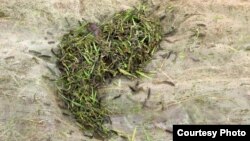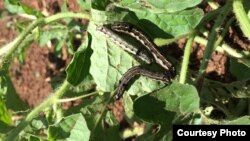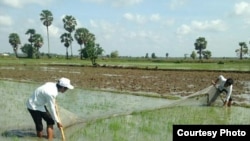Experts have blamed anthropogenic climate change for the recent outbreak of army worms in Cambodia, following the worst drought the country has seen in decades.
The worms are attacking crops in at least eight provinces, the government said on Friday. Army worms are common in Asia, and each year they wreak havoc on crops including corn, lettuce and beans.
Dy Sam An, deputy director of the department of crop protection and production hygiene at the Ministry of Agriculture, said that the latest onset of the pest had begun in June.
The affected provinces were initially named as Preah Vihear, Tbong Khmum, Kampong Cham, Banteay Meanchey, Oddar Meanchey, Prey Veng and Stung Treng, with Siem Reap and Kampong Thom provinces later added to the list.
“Until [June] 17th, the outbreak of army worms had spread to 7 or 8 provinces already, and it’s destroying [the crops],” Sam An said. “The General Department of Agriculture is taking action and assigned specialists to every affected province.”
According to a statement on Wednesday, the ministry blames climate change for causing the recent drought, which in turn led to a worse army worm infestation than usual as the heavy rains that followed the dry spell encouraged their spread.
“Yes, it is because of climate change, which caused highest temperatures this year, and the drought,” Sam An said. “When it is dry and then we get sudden heavy rain, it gives suitable weather for this insect to breed.”
Some 80 percent of Cambodians are said to rely on farming for their livelihoods, according to government data.
Temperatures soared to near record heights over the past few months, leaving rice paddies, streams and ponds bare. Millions of farmers have struggled to find water, while rare and endangered species of animals have died en masse from dehydration.
The worms, which destroy crops, do not pose a direct health risk to humans, Sam An added, but the full scope of the damage they have inflicted is not known.
Sam Vitou, executive director for the Cambodian Center for Study and Development in Agriculture (CEDAC), said the worms targeted vegetables that had been sprayed with chemical fertilizers and had been subjected to other intensive cultivation techniques.
“But, I have not seen them in the farms, where farmers use organic fertilizer, compost, or their own home-made fertilizer,” Vitou said.
He also expressed concern over the potentially severe impacts on rice crops in Cambodia if the worms continued to spread.
“If the rain keeps falling like nowadays, I think it will not be affected very much,” he said. “However, it will destroy farmers’ plants and seedlings if the rain stops one or two months from now.”
The agriculture ministry instructed farmers this week to use butterfly traps and dig water channels around fields to avoid the further spread of the worms.










